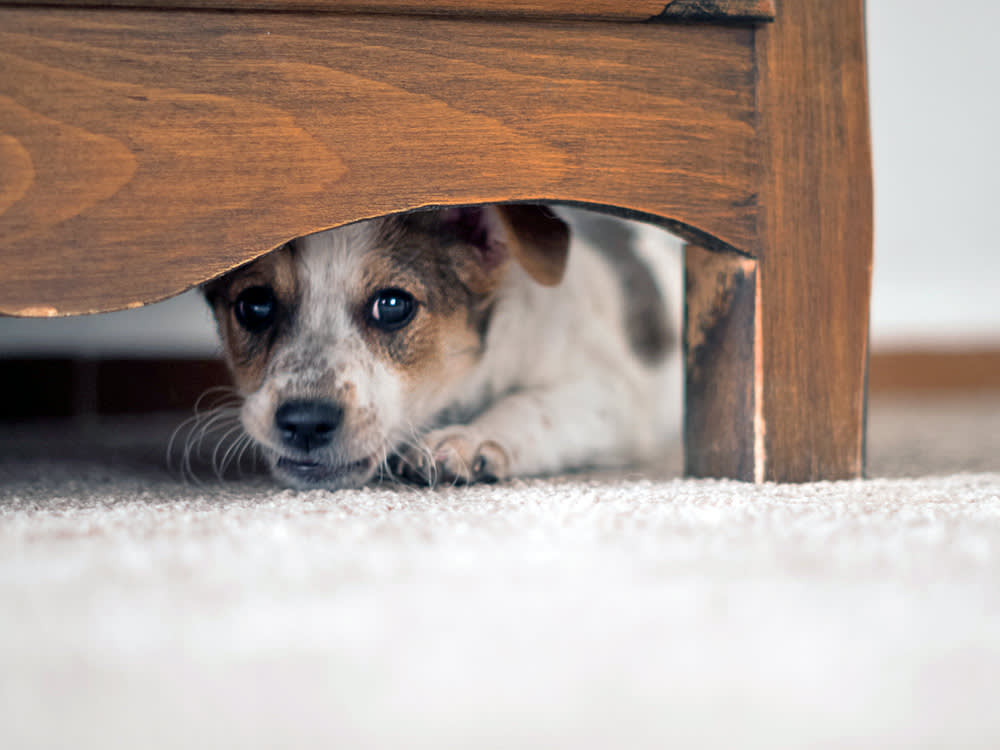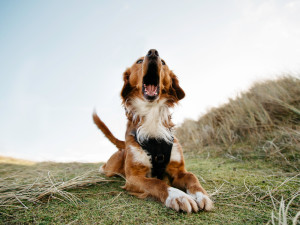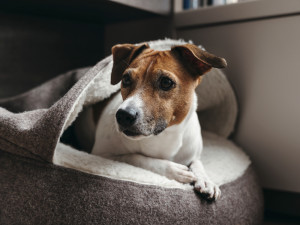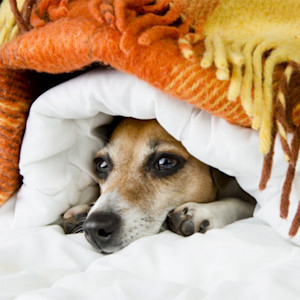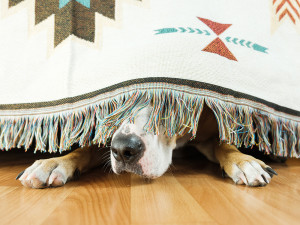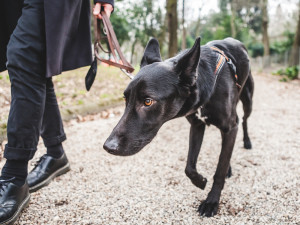Does Your Dog Freak Out at Loud Noises? Here’s How to Help Them
Is your dog scared of every little noise? Here’s how to turn the volume down on their anxiety
Noise sensitivity in dogs is a common but distressing problem that can impact their quality of life. Whether it’s fireworks, thunderstorms or everyday household sounds (vacuum cleaner… we’re looking at you), these triggers can cause anxiety and stress in our pets.
Noise-sensitive dogs face many challenges that can severely impact their daily life, making even the most mundane tasks seem like an ordeal. Sound sensitivities can present in the form of fearopens in a new tab and anxiety-based responsesopens in a new tab to noise-related stimuli. This includes everything from sudden loud sounds that might scare humans, too, such as the aforementioned fireworksopens in a new tab and thunderstormsopens in a new tab, but also noises that we might find innocuous, such as doors or cupboards slamming.
littleKin™ is Kinship’s home just for puppy and kitten parents. Bop over to check out expert advice, new pet tools, and special deals—all curated for your newest family member.
opens in a new tabAs pet parents, we strive to ensure our canine companions feel safe and protected as we walk them through life, so how can we do our best to understand potential noise-sensitive triggers and what positive steps can we take to help make their world seem just a little less scary?
Causes of noise sensitivity in dogs: understanding triggers and risk factors
Understanding how and why your pet could develop some form of noise sensitivity is key to helping them move forward. Firstly, dogs can hear up to four times more than humansopens in a new tab, so you can only imagine how much they’re hearing. Secondly, the Waltham Petcare Science Instituteopens in a new tab explains that noise sensitivity in dogs may stem from a lack of positive socialisation experiences as a young puppy or from negative past experiences.
However, it is also important to note that there may be a possible correlation between noise sensitivity and pain in dogsopens in a new tab, so you should always speak to a qualified veterinarian to rule out any potential underlying causesopens in a new tab, particularly if your dog is regularly experiencing severe reactions to noise.
Waltham also notes that changes to household dynamics (such as moving to a new house or the arrival of a new baby) and any disturbances, large or small (such as a stranger at the dooropens in a new tab or loud fireworks), can be a source of stress and a gateway to unwanted behaviour. In this way, a dog’s environment can directly affect their emotional well-being and quality of life.
Understanding how your dog’s external and internal environments impact them, and which factors influence their environment, can help you make modifications to help your pup. In some cases, it will be possible to modify your home environment, for example, by closing the door to minimise the sound of noisy appliances. You could also ask a family member to time the dog’s daily walk to coincide with when household chores such as vacuuming and loud chores are taking place. However, this may not always be a practical long-term solution.
Are some dog breeds more prone to noise sensitivity?
A web-based surveyopens in a new tab conducted in Norway estimated the prevalence of dog sensitivity in 17 dog breeds. A major focus was placed on weather conditions such as thunderstorms, noise from heavy traffic, along with loud noises such as bangs and gunshots. On average, it was revealed that approximately 23 percent of dogs were reported to be fearful of noises.
Norwegian Buhunds, Irish Soft Coated Wheaten Terriers and Lagotto Romagnolos were breeds that had the highest frequency of noise sensitivity while Boxers, Chinese Cresteds and Great Danesopens in a new tab had lower frequencies of fear created by noise. There was also a significant trend of increasing fear with older age. Interestingly, female dogs were reported to have higher odds of noise sensitivity.
Herding and working breed dogs are especially prone to noise sensitivity and as such, it is important that you not only do your own research before choosing a working breed as a family pet but also to ensure that you are purchasing from a responsible and knowledgeable breeder.
“Working and herding breeds have been artificially selected for many years to work closely with humans and be highly responsive to undertake specific tasks,” says Dr Tammie King, an animal behaviour researcher at the Waltham Petcare Science Institute. “As such, they tend to be very attuned to their environment which would ensure they react effectively to human voice or changes in the environment around them to be successful as working dogs. This sensitivity, however, may make them more prone than other breeds to being noise-sensitive.”
Noise sensitivity in adverse weather conditions
The weather can often be a big trigger for noise-sensitive dogs. Loud thunderstormsopens in a new tab can cause our pets to become anxious and scared. Most storms will pass quickly, so staying calm and providing our dogs with a comforting and soothing presence will likely help.
Try to find a quiet spot in the house where you can set up your dog’s bed or crate with all of their favourite items. Offering items of enrichment such as a yak milk bone or licky mat may help to distract them from the events taking place outside. Providing background noise such as a calming radio channel or TV showopens in a new tab also may be useful.
If your dog is sensitive to noise, try to keep an eye on the weather forecast and avoid taking them on walks where rain and wind may cause them to become overstimulated. Traffic noise is often exacerbated by surface water and windy conditions will result in outside noises being harder to manage. Choosing a quieter time of day such as early morning or later in the evening when there is less risk of busy or distracting circumstances may also help.
How to help a noise-sensitive dog: tips for managing anxiety
Giving our puppies the best possible start to life will eventually help them to become confident and calm in their adulthood. Start training and socialising your dog to different noises as soon as possible when you get your puppy home. Clinical animal behaviourist Emily Birchopens in a new tab offers some helpful tips:
Desensitisation: YouTube has a plethora of sounds you can use from cars backfiring, to gunshots, to fireworks and even babies crying. Play these in the background when you feed your puppy or when they’re ready to sleep and it will help them to learn that these noises are safe. You can turn the volume up really slowly over sessions until they’re happily relaxing/chewing/eating through banging sounds or fireworks.
Positive reinforcement: if you make sudden noises at home follow this up with something really pleasant for your dog. For example, if you drop your keys or something that makes a loud noise, scatter some high-value food around your puppy straight away. We want them to equate that a loud sudden noise means something tasty is coming their way, triggering a positive association.
Safe spaces: on firework nights, try to limit the noise exposure as much as possible. Fireworks can be so loud and a very close firework display can make even the most confident puppy a bit nervous. Have the TV on, lights on and curtains shut. Give your dog something fun to keep them distracted, such as a filled Kong toyopens in a new tab or licky mat.
Long-term solutions and breeding considerations
Getting the foundations right is the key to a well-socialised start in life, particularly when it comes to different noises. “A good breeder will have done elements of early positive exposures helping your puppy to start on the right foot, says Emily. “So doing your research into how the puppies have been raised in those key early weeks is incredibly important.”
Dr King also offers some important advice on careful breeding. She explains, “To alleviate this genetic predisposition to noise sensitivity, it is important for breeders to conduct assessments of their breeding stock to ensure they are selecting dogs for breeding who don’t exhibit noise phobias. There are certainly behaviour modification, desensitisation, and drug therapy that can be applied to dogs who exhibit behaviours related to noise sensitivity but it does not change the underlying genetic predisposition they may have.”
In summary, every dog is different and there is certainly no magical cure to noise sensitivity but working together, you and your pup can navigate the ups and downs together.
